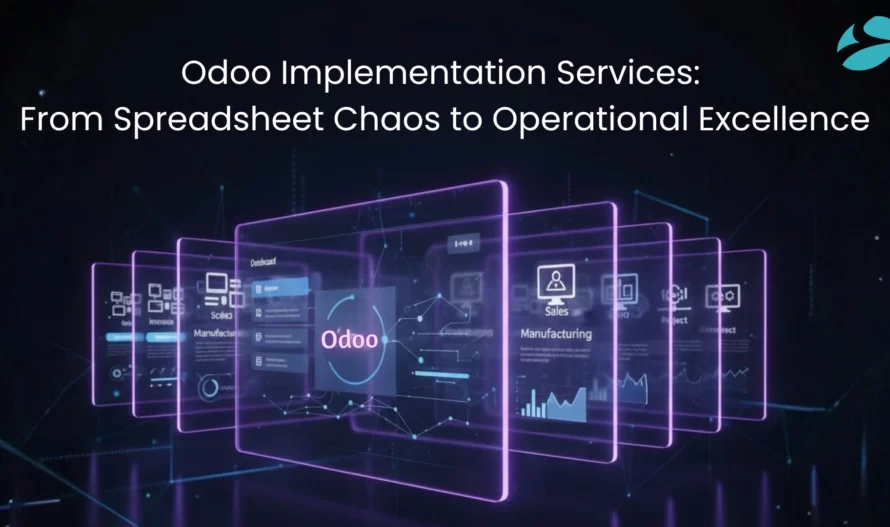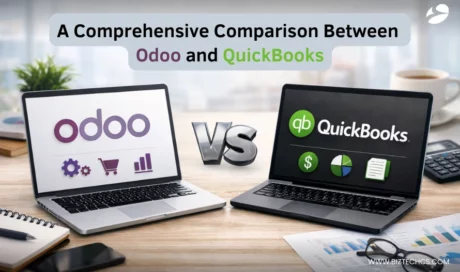405
Odoo Implementation Services: How Expert Partners Transform Business Operations
5 min read
405
5 min read

Almost every business experiences chaotic business processes when it uses multiple management channels and/or platforms. For instance, a business might use emails and Excel sheets for finance management, WhatsApp to coordinate with sales, and Slack to communicate with other departments.
If this sounds familiar, then you are not alone, and you probably understand what kind of chaos we are talking about. You may also understand why this chaos is a significant hindrance to business growth.
This fragmentation is killing productivity across industries. That’s where Odoo implementation services come in — though let’s be honest, the software itself won’t magically solve everything. What really matters is finding a partner who understands your business, is familiar with local regulations, and can deliver results without overspending your budget.
Here’s the thing about Odoo — calling it just an ERP misses the point entirely. Think of it as business Lego blocks. You need inventory tracking? There’s a module. Want to connect your online store to your accounting system? Another module clicks right in.
Want to monitor your logistics system? Or oversee your product manufacturing? There’s a module for that as well. The system seamlessly integrates into your workflow, becoming an invisible assistant.
Manufacturers use it to track every screw from the supplier to the assembly line. Retail chains run their entire multi-location operations through it. Even a small trading company in Dubai has finally figured out its VAT nightmare using the platform. The open-source nature means you’re not locked into someone else’s idea of how your business should run.
But here’s the catch — and vendors won’t tell you this upfront — Odoo’s flexibility becomes its weakness without proper guidance. Companies that dive in alone often end up with a bigger mess than they started with. That’s why smart businesses invest in experienced Odoo implementation services from day one.
The companies that succeed with ERP aren’t necessarily the biggest or most tech-savvy. They’re the ones who treat implementation as business transformation, not IT procurement.
A poorly planned rollout will lead to numerous issues, including but not limited to tax audits, process complexities, and reduced team morale, ultimately adding to your financial burden. Meanwhile, companies with the right Odoo implementation services partner see productivity jump within weeks — we’re talking 30-40% improvements in some departments.
Take, for example, a trading firm that manually keeps count, assesses missing stock, and calculates VAT. Such businesses are one miscalculation away from disaster. Odoo integration can significantly help such businesses to get their business in order. This includes integrating an ERP that complies with local regulations (such as those in the GCC) and trading workflows.
As messy as the transition from manual to digitized systems can be, with the right integration partner, it can be simplified. Here’s a simplified step-by-step approach:
Your implementation partner will dig into everything related to your business. They’ll ask questions such as “Why does John in purchasing need three approvals for a $50 order?” or “Who actually uses that 47-column spreadsheet you’re so attached to?”
This phase separates good Odoo implementation service providers from the rest. The good ones don’t just document processes; they challenge them to improve. At this stage, the client may discover that they were paying for warehouse space to store obsolete parts nobody remembered ordering. That’s the kind of insight that pays for the entire project.
Regional compliance is also handled here. Saudi ZATCA requirements? UAE corporate tax? Indian GST? Your partner had better know these inside out, or you’ll be scrambling to fix things post-launch.
Now comes the fun part — building your digital workspace. But it’s not about cramming in features. You do not need 200 custom features for some unforeseen future when you might need them. There’s a really high chance that you won’t.
Smart configuration means starting lean. A logistics company struggling with delivery tracking can start with fleet management and invoicing systems. Perhaps six months later, once the team is comfortable with the digital system, the company can move on to procurement and advanced analytics. Gradual adoption helps with easy integration and process acceptance.
Your Odoo implementation services team should simulate actual business scenarios during this phase. Can your Riyadh branch generate Arabic invoices while Mumbai handles rupee transactions? Will the warehouse barcode scanner work with your existing labels? These aren’t theoretical questions — they’re Tuesday afternoon problems waiting to happen.
Remember all that historical data sitting in various systems? It needs to move, and it needs to move correctly. I’ve seen migrations where customer addresses got scrambled, resulting in Dubai locations being listed as Delaware. Not ideal when you’re shipping physical products.
Professional teams utilize structured approaches, such as cleaning data before migration, mapping relationships carefully, and running parallel systems during the transition. It might take a little longer than usual, but the step must not be skipped.
Using the same logistics company example (as in the previous step), one can assess the data and identify errors in calculating their margins for past years. Discovering this during audits, rather than during an audit, saves your brand’s reputation and resources.
The best Odoo implementation services make this invisible to daily operations. Your team keeps working while data moves in the background. When Monday morning comes, everything’s where it should be.
You know what kills ERP projects? When staff find the new system way too complex and immediately want to go back to the older ways.
It is best to implement role-based training instead of introducing the new system as a single, generic integration. This helps staff get comfortable with the new digital system without feeling overwhelmed.
Warehouse staff learn scanning and picking. Sales focuses on quotations and customer tracking. Finance masters automated reconciliation. One session where an accountant watches VAT calculate automatically is worth a dozen PowerPoint presentations.
During UAT, let teams break things. Seriously. The warehouse manager who accidentally created 10,000 phantom units taught us more about safeguards than any requirements document. These mistakes during testing prevent disasters during operations.
Launch day arrives. Hearts race. Fingers cross. Then… business continues. That’s a successful go-live — boring and uneventful. Your Odoo implementation services partner monitors everything, adjusting configurations based on real usage patterns.
The magic happens weeks later. Reports generate in seconds, not hours. Inventory accuracy hits 99%. Customer complaints about shipping delays disappear. Teams stop fighting over data because everyone sees the same dashboard.
But implementation isn’t done at go-live. The best partners stick around, helping you expand. Started with core modules? Maybe it’s time for HRMS. Seeing success in operations? Let’s add customer portals. Growth becomes systematic, not chaotic.
Numbers tell stories better than promises. And here’s what our existing clients experienced post-implementation:
A furniture manufacturer claimed that after integrating MRP with purchasing and inventory management, stockouts dropped by almost 90%. And missed delivery deadline? It is a forgotten memory.
A retail chain connected its 14 stores through a unified POS and inventory management platform. They were able to access real-time visibility, which helped them give a conclusive answer to their customers. Their revenue increased by almost 18% just by improving their inventory management system.
A logistics company automated its fleet management and reduced the fuel cost by 22% by route optimization. And ZATCA compliance that used to take days? Gets done automatically with each invoice.
These are just a few of the many positive impacts of Odoo implementation services that align with actual business needs. It helps businesses resolve actual roadblocks instead of guessing what might work. So choose your integration carefully and let Odoo handle the rest.
Now that we know what good will happen with Odoo, here are some of the considerations that you must keep in mind to avoid failed implementations or any financial burdens:
Process documentation may seem boring until you realize that nobody knows why invoices require five approvals. Document first, automate second, or you’ll digitize inefficiency.
Over-customization feels powerful until upgrade time. That custom module handling your “unique” process will break with every update. Sometimes, standard features with slight workflow adjustments work better than perfectly customized solutions.
Training shortcuts save time until go-live, when panicked emails flood the IT department. One day of proper training prevents weeks of support tickets.
Price shopping makes sense until your cheap partner can’t handle local tax regulations. Fixing compliance issues costs more than doing it right initially.
Choosing the right integration partner requires brutal honesty. This is because you want someone who understands your industry needs, understands your language (especially in the multi-region operations), and someone who will also offer post-implementation maintenance.
But how to find the right Odoo implementation services provider? Here are the following questions that can help you with that:
Have they handled your country’s regulations? This will help you understand if they have previously worked with the relevant regulations and if they are familiar with the requirements.
Can they show similar industry successes? That is, if they have worked with another business in the same industry as yours, or if they have enough knowledge to work in your industry.
Do they offer phased rollouts that match your capacity for change? This is so important because it will also define how well your team adjusts to the system. Faster implementation will leave less room for them to try and get used to the system.
Do they explain things clearly or hide behind jargon? This question is especially important for those with little to no technical expertise. Technology integration requires clarity. An integration partner who translates those technical jargons into easy-to-understand terms is always the best choice.
The right Odoo implementation services provider is not someone who simply nods and goes with whatever you say. They suggest better approaches, celebrate your wins, and push back on not-so-favorable choices.
ERP success isn’t about buying software — it’s about transforming how you operate. The journey from spreadsheet chaos to operational excellence requires a guide who knows the terrain.
At BiztechCS, we’ve spent over a decade helping businesses across the UAE, Saudi Arabia, India, Europe, and North America make this transition. We deliver practical results that address your specific problem statements, not just presentations, through our Odoo implementation services.
Our consultants work within your reality while pushing toward your potential. From initial discovery through years of optimization, we’re there — making sure technology serves your business, not the other way around.
Are you ready to transform your business processes from chaos to well-defined ones? Let’s discuss how Odoo implementation services can elevate your business to the next level.

Artificial Intelligence (AI)
94
By Nandeep Barochiya

Odoo
189
By Uttam Jain

Artificial Intelligence (AI)
389
By Nandeep Barochiya